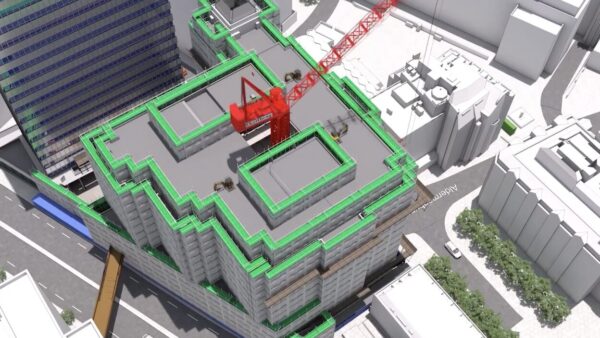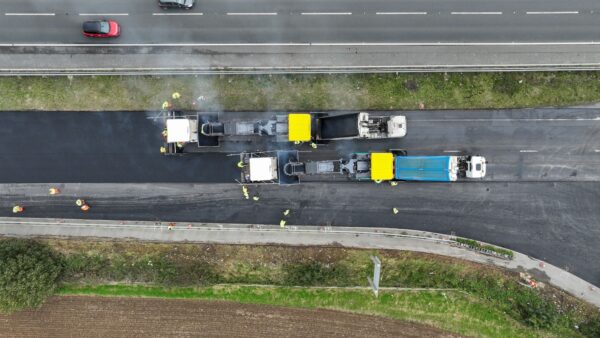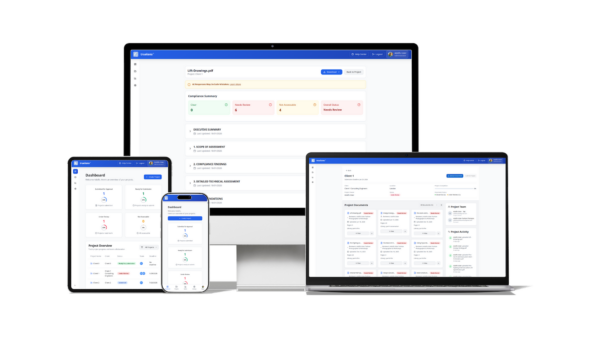The Digital Construction Awards attracted 170-plus entries this year, 85 of which have been shortlisted. Here, we detail the finalists for the Digital Construction Project of the Year award.
This category celebrates what can be achieved through the successful implementation and adoption of digital processes and technologies on a project (either a new build project or a maintenance, retrofit and refurb project). This can apply to a specific issue or challenge or package on a project or the entire project.
Four projects made the shortlist.
40 Charter Street, Canary Wharf | KPF/Canary Wharf Group/Aecom/Revizto/Dome Group/Disperse

40 Charter Street is a 52-storey, 552-unit residential tower within the Wood Wharf masterplan at Canary Wharf. Projects there have the inherent challenges of waterfront sites, ambitious timelines and the large scale of each building. In addition, 40 Charter Street underwent a major redesign to reflect increased work-from-home requirements post-pandemic.
Using Canary Wharf Contractors, its in-house construction delivery group, Canary Wharf Group benefited from early contractor engagement and CWG’s knowledge of coordination and delivery. Its involvement, alongside consultants committed to digital workflows, allowed an efficient method of capital asset delivery, with each party fully engaged with the digital approach.
Supported by long-term partner KPF in the development and enablement of the project delivery strategy, CWG invested in core technologies that would help to realise their digital ambitions. This included: Revizto for open, transparent coordination and issue tracking on the design side; Dome for snagging, handovers, inspections, electronic task management; and the use of Disperse for onsite image capture, management and progress tracking.
Each new tool went through a rigorous assessment process that started with clear definition of the requirements, identifying products available, capability review and usability and performance assessments on live projects.
Long-term operational excellence is a priority for CWG, and in the event of any issues, access to detailed project data facilitates informed decision-making before any physical intervention. Teams can leverage Revizto for 3D model verification, Disperse for reviewing historical 360-degree photo documentation, and Dome for quality assurance records, ensuring a proactive approach to asset management.
Belfast Grand Central Station | Translink/Farrans Sacyr JV/Babcock

Translink, Northern Ireland’s public transport body, faced major challenges with the construction of Belfast Grand Central Station (BGCS), the island’s largest integrated transport hub with a footprint bigger than London’s King’s Cross station.
With five major contracts running in parallel – enabling works, bridgeworks, rail, station construction and utilities – the digital challenge included managing vast amounts of data and ensuring real-time collaboration between contractors, the Department for Infrastructure, regulatory bodies and local communities. Each had different priorities, requiring a robust framework to ensure compliance, efficiency and consistency.
ISO 19650 standards for information management were being integrated into the organisation for the first time. Translink also wanted the seamless transition of asset data into its FM system, enabling automated maintenance scheduling, asset validation and optimised reporting.
Thus, Translink’s approach to digital transformation at BGCS was strategic, research-led, and outcome-focused. The project team conducted an early-stage digital audit, identifying that traditional data exchange and manual validation processes would cause delays and compliance risks. To solve this, Translink adopted a BIM-first strategy, integrating ISO 19650-compliant workflows.
Managing the data exchanges across five different contracts and the unavoidable use of four common data environments proved to be challenging, and developments were made with Python scripting and Power BI dashboards to enable automated review and validation of document registers and data sets, eliminating eight hours of manual review per week.
Additionally, this provided stakeholders with deeper insights beyond visualisation, enabling data-driven decision-making for improved station operations and passenger experience.
To enable improved stakeholder buy-in, VR technologies were sourced following an R&D exercise with Digital Catapult NI. Translink implemented VR-based engagement sessions, generating an estimated £10,000 saving.
National Rehabilitation Centre | IHP (Vinci Building/Sir Robert McAlpine)/Buildots

The National Rehabilitation Centre (NRC) project is a landmark initiative being designed and constructed by Integrated Health Projects (IHP), the Sir Robert McAlpine (SRM) and Vinci Buildings JV, for Nottingham University Hospitals NHS Trust. With a £105m investment, this ambitious project is set to deliver a state-of-the-art, energy-efficient facility with 70 beds, as part of the government’s New Hospital Programme later this year.
Traditional construction management often faces inefficiencies, causing budget overruns and missed deadlines. In contrast, the NRC project is distinguished by a digital solution that enabled simultaneous progress monitoring, delay prediction and workforce planning. This approach not only facilitated collaborative decision-making with the supply chain, it also ensured a seamless fit-out sequence.
By tracking workforce numbers on site using biometric turnstile data from Datascope and integrating it with AI-powered progress tracking and delay predictions from Buildots, the digital solution allowed the NRC project team to identify the root causes of bottlenecks through continuous review of past performance. It also accelerated activities by making proactive workforce adjustments, preventing cascading schedule impacts.
To enhance the administration of lookahead planning and thereby improve the efficiency of the process, AI-powered assistants were used to automatically capture key issues and actions in daily logs. For example, Microsoft Copilot was used to automatically interpret discussions, generate action lists and assign responsibilities, ensuring that no actions, commitments or discussions were overlooked. These changes led to a 75% reduction in time spent on administrative tasks, amounting to six to eight hours per week.
This approach not only enabled the NRC project to mitigate five weeks of potential delays, thereby preventing losses exceeding £1m, but also established a new standard for data-driven construction planning.
Woodham Academy | Department for Education/Galliford Try/Space Group/RLB Digital/Space Architects

Last year Galliford Try delivered the Woodham Academy in County Durham for the Department for Education (DfE). The mixed secondary school opened at the start of the 2024/2025 academic year.
The contractor took a rigorous information management approach on the project, with a particular focus on assessment and need, procurement and handover.
The DfE mandated the use of IFC to underpin a robust, data-driven approach to digital asset management. Galliford Try took it upon itself to re-educate the supply chain on IFC to realise its full potential: its ability to provide structured data that supports comprehensive interrogation of design, construction and operational information.
The contractor implemented an upskilling programme, including video tutorials, training guides, and consultant-led workshops. In collaboration with industry experts, including its own digital lead John Ford, RLB Digital head of information management services Rob Jackson, and Space Group (the project architect), Galliford Try supported its supply chain in aligning their outputs with the DfE’s stringent standards.
Solibri’s model-checking tool was deployed to carry out thousands of automated data validation checks in minutes, saving days or weeks of laborious manual verification and dramatically improving data quality and consistency.
It also used advanced rulesets tailored to check against all the requirements that both it and the DfE set, a dedicated information hub integrated with the CDE, and detailed reporting mechanisms to provide a systematic framework for managing digital data and adapting to unforeseen challenges.
To ensure digital information was not lost in handover, Galliford Try ensured that IFC-compliant data was seamlessly integrated into the TwinView digital twin platform that consolidates real-time sensor data with the structured 3D models.
Celebrate with the best
The winners will be revealed at the gala dinner on 1 July at the Brewery in London.
You can join the shortlisted entrants by booking your seats at the awards. There is an early bird discount for those who book tables before 16 May.
The Digital Construction Awards are organised by Digital Construction Week, Construction Management and the Chartered Institute of Building. The first sponsor to be announced is Bluebeam.
To find out more about the Awards, visit digitalconstructionawards.co.uk.














